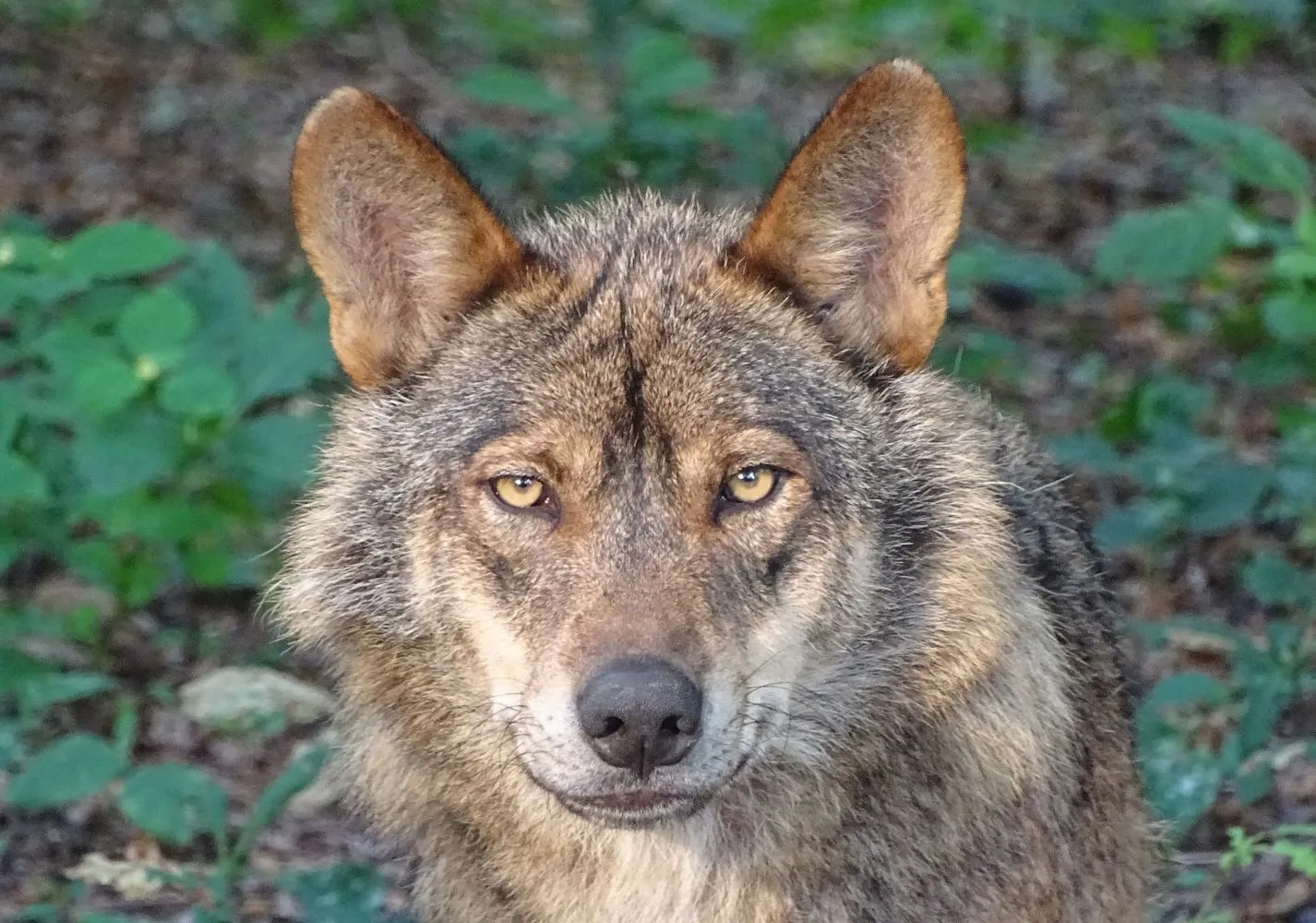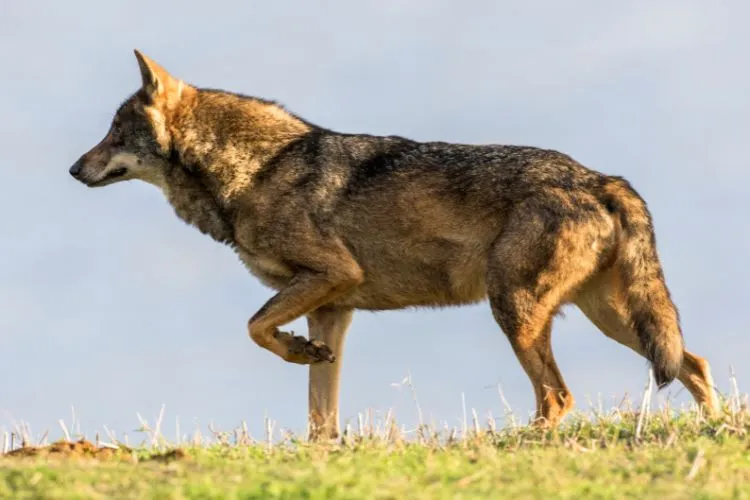23 de January, 2023

When traveling in the north of Portugal, if you are very lucky, you may have a sight that will surely stay in your memory: that of an an Iberian wolf. This beautiful animal is considered by many to be a Portuguese symbol, although it is also present in Spain. In Portugal, it has been protected by law for more than two decades. In addition, several national institutions are committed to preserving this subspecies, developing awareness projects in local communities and promoting ecotourism. Despite these efforts, it is still one of the most endangered animals in the country. Recently, a project to expand the wind farm in Vieira do Minho, of EDP, received an unfavorable decision by the Portuguese Environmental Agency (APA), in the evaluation of the environmental impact study, precisely because it threatens its population.
An ancestor of dogs, this is the last great predator of the country, known for its strength, intelligence, and agility. It played an important role in Portuguese culture and history. It has inspired legends, proverbs, fables, and songs. In this article we will demystify the frightening figure of the Iberian wolf and explain how Portugal has made efforts to protect it. Follow our footsteps and learn more about this animal that may cross your path on your travels around the country!
Get to know some of the main symbols of Portugal

What is the symbolic animal of Portugal? Many will answer that it is the rooster because of its iconic presence, associated with national legends, and so present in the country’s souvenir stores. In Porto, the dragon is present in the city’s coat of arms, monuments, and is the mascot of its soccer club. However, the Iberian wolf is also considered by many as a Portuguese national symbol and has inhabited the region for thousands of years. Even representations of the animal have been found in the rock art nucleus of the Archaeological Park of the Côa Valley.
Realizing your goal of living in Europe or obtaining European citizenship can be simpler than you think. We offer personalized support to make the immigration process more accessible and uncomplicated.
Canis lupus signatus, the scientific name for the Iberian wolf, is a subspecies of the gray wolf and a major predator on the Iberian Peninsula.
É smaller than the common wolf. It has yellow-brownish coatwith black spots on the front of the front paws. This coat changes throughout the animal’s life and also according to the seasons. They are darker when younger and hairier in winter.
When adults they can measure up to 180 centimeters and weigh about 40 kilos. The females are generally smaller than the males. Their size resembles that of a German Shepherd and they are often mistaken for wild dogs.
Carnivore, feeding on large herbivorous prey deer, roe deer, and wild boar. Thanks to its ability to adapt, its diet can change depending on where it lives. For this reason, in regions where their natural prey is scarce, these animals may eat small rodents, chickens, rabbits, cows, sheep, and even horses, which they find in the vicinity of settlements.
A curiosity: they eat an average of 3 to 5 kg of meat per day. However, they can go several days without eating. They also have the capacity to consume up to 10 kg of meat in one meal, making the most of all the food available.
They live in packs, formed by the reproductive couple and their offspring. They reproduce once a year, and may have between 2 and 11 offspring, which are born in the months of May and June.
They usually inhabit regions with low demographic density, that is, preferably far from man, which has become increasingly difficult due to the humanization of the landscapes.
Superpredator, the wolf controls the populations of its wild prey, decreasing the occurrence of diseases in the species it feeds on (they tend to hunt weak or sick specimens).
In some regions, wild boar represent more than 40% of the wolves’ food. By consuming wild boar and deer, they reduce the damage they cause to agricultural and forestry crops. It also prevents them from transmitting diseases such as tuberculosis and brucellosis to livestock. In addition, it reduces the numbers of other carnivores, such as the fox, the gineta, the badger or the weasel, minimizing their impact on domestic animals and hunting.
In the entire Iberian Peninsula there are about 2,300 Iberian wolves. The last national census of the species was published in 2005. At the time there were about 300 wolves and 51 confirmed packs in Portugal.
A new census was conducted between 2019 and 2021, and the results should be released at the end of 2023. “The expectation is that, the population will be maintained in numerical terms, although there may be news regarding the location of these animals,” adds Isabel Ambrósio, from the Lobo Group.
The Iberian wolf lives specifically in the Iberian Peninsula, in Portugal and Spain. In Portugal they live in two nuclei, in the northern region. North of the Douro River, near Bragança (Montesinho Natural Park) and Vila Real. South of the river, in Aveiro, Viseu, Guarda.
In the Northeast Transmontano, thanks to its biodiversity and satisfactory number of wild prey, few cases of attacks against domestic animals are recorded.
In the Côa Valley, environmental recovery (rewilding) projects have attracted animals of various species, including this subspecies of wolf.
There are also wolves inhabiting the municipality of Mafra, 30 km north of Lisbon. They are part of the Iberian Wolf Recovery Center (CRLI) an educational center and sanctuary that currently houses 8 wolves that cannot live in the wild.
A curious fact: wolves can travel tens of kilometers and colonize places where they did not exist before, as well as returning to others previously occupied. In 2021, an Iberian wolf was seen again in Castelo Branco district where it had already been reported extinct. It is estimated that the Iberian wolf can travel an average distance of 34 km. Therefore, if you spot a wolf in a region not previously mentioned, do not be alarmed.
Today, what most endangers the wolf is the persecution suffered by hunters and ranchers, motivated by the desire to prevent attacks on livestock, out of ignorance or fear.
The decline of the wolf population in the Iberian Peninsula began to be noticed at the end of the 19th century. The increase in agricultural activity led to the disappearance of native vegetation and this made the wolf’s natural prey become scarce. Lacking roe deer and wild boar, these predators began to live near villages and farms, and domestic livestock became their main food. For this reason, they became hunted by men. Poison, shooting and trapping are the main reasons for the decline of the Iberian wolf.
Another cause pointed out by environmentalists is the lack of places of refuge and the destruction of ecosystems with the construction of dams and wind farms. With more roads, the number of accidents involving these animals also grows: 35% of wolf deaths are by being run over by a car.
The Iberian wolf is a species that has already disappeared from half of the Iberian Peninsula. In Portugal, the species is classified as Endangered (EN), according to the Red Book of Vertebrates of Portugal.
No. Wolves are not dangerous to people. They are afraid of humans, they avoid their presence and all the disturbance it causes. “The only record in Europe of a wolf attack on a human being occurred decades ago, and the animal was sick, carrying the rabies virus,” explained Isabel Ambrosio, from the Lobo Group.
Many myths have helped build (and reinforce) an image of the wolf as a cruel and dangerous being. Who has never read children’s tales in which the wolf appears as a villain? Just to name a few: “Little Red Riding Hood,” “The Three Little Pigs,” “Peter and the Wolf. Well before these stories were written, Christianity already used the terms “wolf” and “lamb” as a metaphor for opposite concepts: “the good shepherd needs to protect his lambs from the wolves”. Currently, the NGO Grupo Lobo works to deconstruct this idea.
No. The Iberian wolf has the status of a strictly protected species in Portugal, according to the Iberian Wolf Protection Law (Law n.º 90/88 of 13th August e Decree-Law 54/2016 of August 25). It is forbidden to slaughter, capture, detain, transport, commercialize, as well as exhibit specimens, disturb or destroy their habitat. It is also expressly forbidden to breed these animals as pets, something that can sometimes happen due to misinformation, since they are confused with domestic dogs.
To prevent hunting, the Portuguese government also compensates cattle farmers for damages caused by wolves. The validation of the attacks is done by the Institute for Nature Conservation and Forests (ICNF). Cattle farmers must follow rules stipulated by law to have access to compensation.
Preserving the natural habitat of the wolf is the first step toward conservation of the species. In the short term, community education and awareness are the most effective way to prevent population declines.
The Iberian wolf can coexist with human activities, including livestock, as long as the livestock is properly protected. It is necessary to promote alternatives for the protection of livestock.
The use of cattle dogs and wolf-proof fencing are an alternative to prevent attacks. Through the program Cattle Dog program, the Lobo Group makes national breeds available to herders so that they can protect their herds. Among the breeds most used in the project are the Castro Laboreiro Dog and the Estrela Mountain Dog (photo).

The wolf avoids contact with humans, so it will not be easy to encounter it in its natural habitat. If you want to see this animal in the wild, a simpler alternative is to visit the Center for the Recovery of the Iberian Wolf (CRLI)of the Lobo Group. With some luck, you will be able to observe these animals in a semi-natural environment.
The Center for the Recovery of the Iberian Wolf (CRLI) was created by the Lobo Group in 1978. It is not a zoo, but a sanctuary that occupies an area of 18 hectares in the municipality of Mafra. It currently shelters 8 wolves that can no longer live in freedom. These animals are victims of traps, illegal captivity, other parks and zoos.
At CRLI, it is possible to walk along a trail that passes through the various enclosures on site, for observation of the resident wolves in conditions similar to their natural habitat. The visit is guided by experts, but it is not entirely guaranteed to see the animal. The chance of spotting them is around 50%, and is more likely on colder days.
The space also houses exhibitions and an interpretation center. “It’s a very interesting program, even if you can’t see the wolf in nature”, guarantees Isabel.
Founded in 1985, the Lobo Group is a non-governmental environmental association (ENGA), independent and non-profit. It is responsible for the Centro de Recuperação do Lobo Ibérico (CRLI). It acts entirely for the preservation of the Iberian wolf and its ecosystem in Portugal. Besides developing awareness and environmental education projects, the Lobo Group has also helped to develop and implement laws to protect these animals.
The Grupo Lobo works based on support and donations. Would you like to be a member of the association or sponsor a wolf? Do it by clicking here.
Protecting the Iberian wolf is one of several missions of this non-profit organization, which is a partner of Rewilding Europe, founded in 2011. Since 2019 it has been committed to strengthening a 120-hectare wildlife corridor in the Great Côa Valley. Rewilding Portugal seeks to create the conditions for a habitat restoration in which nature heals itself by repairing what has been harmed, thus arriving at landscape restoration and the preservation of wild animals, including the Iberian wolf.
Portugal is a country full of enchantments. If you want to move to the country or obtain your Portuguese citizenship, talk to Atlantic Bridge!
*Silvia Resende is a journalist at Atlantic Bridge. From Bahia, she arrived in Portugal in 2015 to build a new life together with her family. She has a degree in Communication from UFBa, in Brazil, and a Master in Communication Sciences from the University of Porto. She has worked as a TV host, reporter, event producer, public relations and tour guide in Porto. She loves to travel and to discover the cultural and natural heritage of each place she visits. She has visited CRLI and recommends it to her readers.

Author:
Atlantic Bridge